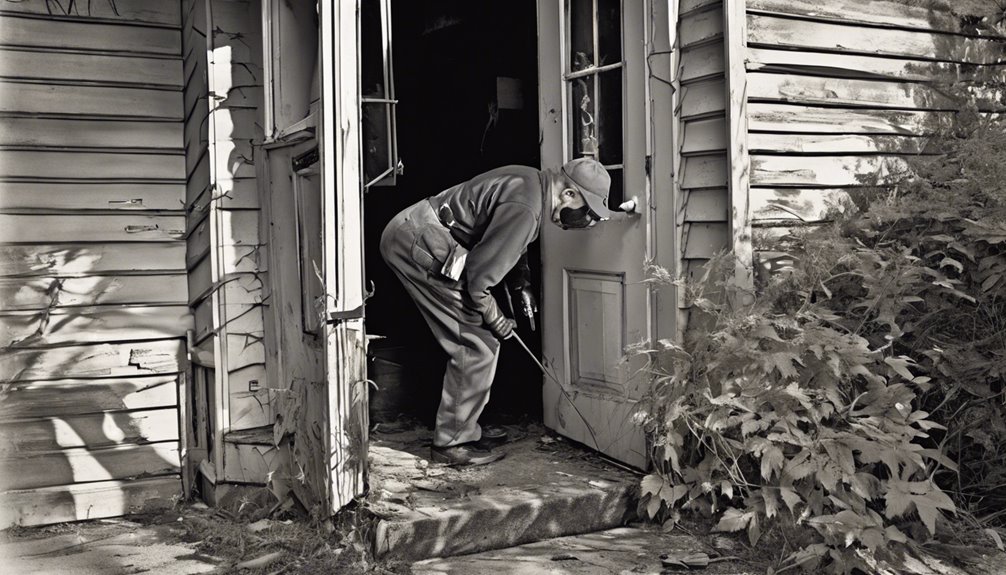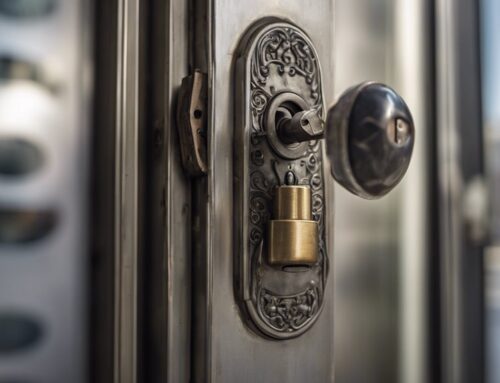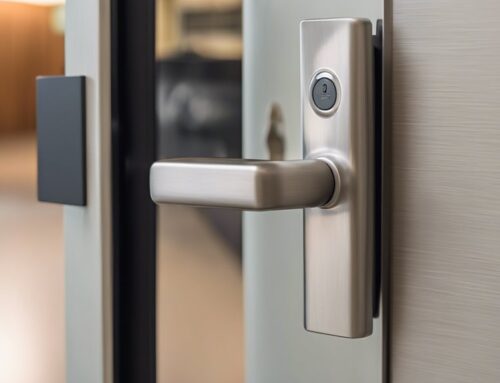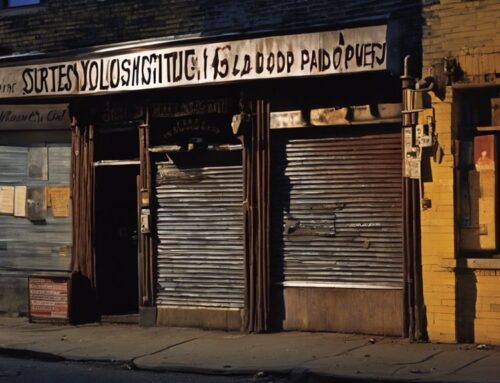You might not realize how essential locksmiths become in Pennsylvania's foreclosure processes, especially during the critical post-eviction phase. Once a property is vacated, these professionals step in to secure the home, changing locks and documenting each action to meet legal requirements. This not only protects new ownership but also plays a significant role in deterring potential break-ins. Understanding their responsibilities can shed light on how these services impact the overall security of properties in flux. What are the broader implications of their involvement in the foreclosure landscape?
Key Takeaways
- Locksmiths secure properties post-eviction by changing locks, ensuring no unauthorized access occurs for new ownership.
- Compliance with legal requirements is crucial for locksmiths to prevent unauthorized access and maintain property security.
- Licensed locksmiths are essential for reliable service during foreclosure processes, enhancing safety and maintaining community standards.
- Regular inspections and maintenance by locksmiths ensure locks function properly, deterring unauthorized entry in abandoned properties.
- Documentation of lock changes is vital for legal records, safeguarding against potential disputes related to property access.
Understanding Foreclosure in Pennsylvania

Understanding foreclosure in Pennsylvania can be intimidating, especially since it involves several legal steps and potential pitfalls. Knowing the pre-foreclosure process is key to maneuvering this challenging landscape.
When you fall behind on mortgage payments, federal law grants you a 120-day loss mitigation window. During this time, your lender must notify you of their intent to accelerate the loan before they can pursue foreclosure. Use this period wisely to catch up on missed payments, including any interest and fees.
Once you're 120 days past due, your lender can file a foreclosure lawsuit in the county court where your property is located. This is essential since Pennsylvania operates under a judicial foreclosure system. The complaint will include specific details such as names, addresses, and the mortgage amount. In Pennsylvania, a locksmith's responsibilities during eviction procedures are also governed by legal considerations, ensuring compliance and professionalism throughout the process. Locksmiths in Pennsylvania benefit from professional recognition when they maintain proper licensing, which underscores their role in legally sensitive procedures like foreclosures.
You'll be served court documents, giving you 30 days to respond to them. Ignoring this notice can lead to a default judgment against you. A breach letter must be issued to notify you of the loan default and outstanding balance, reinforcing the importance of timely communication during this period.
If you find yourself at risk of foreclosure, don't hesitate to seek help. This window allows you to explore alternatives, like loan modification or other financial assistance options that can prevent foreclosure.
Stay engaged and proactive; your active participation in the process can greatly influence the outcome. Remember, the initial stages of this process are your best chance to take control and potentially avoid losing your home. Understanding and acting during this vital period can pave the way for solutions to restore your financial freedom.
Legal Rights of Homeowners

As you navigate the complicated foreclosure process, it's crucial to know your legal rights as a homeowner. Federal law mandates that lenders must reach out to you—both by phone and in writing—before they can initiate foreclosure proceedings. This communication should include discussions about loan modifications, payment plans, or forbearance options.
Don't forget, you must be more than 120 days behind on payments before they can start this process. It's also important to know that unlicensed locksmithing in Pennsylvania carries significant penalties, so always verify the credentials of any locksmith involved in foreclosure processes. In addition, locksmiths in Pennsylvania can be held liable if they fail to follow proper procedures, potentially contributing to break-ins due to negligence.
Under Pennsylvania law, the lender is required to provide a 30-day notice of intent to foreclose. This notice gives you a critical opportunity to catch up on missed payments and cure any defaults. In cases where the property is deemed abandoned homes, lenders may expedite the foreclosure process, skipping the notice requirement entirely.
Once you receive this notice, you have 30 days to respond, which could involve raising objections or counterclaims regarding the foreclosure.
You also have specific assistance avenues available to you. The Homeowners' Emergency Mortgage Assistance Program (HEMAP) can help cover overdue payments if you apply within 33 days of receiving an Act 91 Notice.
Further support is available through free housing counseling by the Pennsylvania Housing Finance Agency, aimed at preventing foreclosure.
If court proceedings do arise, you may be entitled to a Conciliation Conference and a temporary stay.
Know that the sheriff must give you at least 30 days' notice before any sale occurs. Understanding these rights empowers you to advocate for yourself effectively during this challenging time.
Locksmiths and Abandoned Properties

When a property becomes abandoned, locksmiths play an essential role in securing it against unauthorized access and potential vandalism. Their expertise not only protects the property but also enhances community safety. You might not realize the importance of locksmiths in this situation until you witness the impact of their work firsthand. In Pennsylvania, locksmiths must comply with essential safety standards to ensure that locks are both effective and legally compliant. It is crucial for locksmiths to understand key duplication laws in Pennsylvania to ensure their practices adhere to state regulations when securing properties.
Here's a quick look at some key services locksmiths provide for abandoned properties:
| Service | Description |
|---|---|
| Securing Vacant Properties | Locksmiths secure abandoned sites to prevent intrusions. |
| Specialized Locks | Installing advanced locks to deter potential intruders. |
| Regular Inspections | Performing assessments to verify all security measures work efficiently. |
Additionally, locksmiths conduct maintenance and repairs on existing locks to prevent deterioration, guaranteeing safety for authorized personnel. They also handle emergency lockout situations, enabling swift access when necessary. By collaborating with property owners and managers, locksmiths guarantee that abandoned properties remain secure and monitored. Furthermore, they offer commercial locksmith solutions that address the unique needs of various sectors, enhancing property security. As professionals, locksmiths must adhere to safety standards and regulations to minimize liability while protecting valuable assets within these properties. Through their efforts, they reduce criminal activity in the vicinity, helping maintain property values worth mentioning. The importance of locksmiths in securing abandoned properties can't be overstated; they not only safeguard these spaces but also support the overall well-being of the community. So, the next time you see a vacant property, remember the vital role locksmiths play in its security.
The Eviction Process Overview

The eviction procedures in Pennsylvania can be complex, especially for landlords maneuvering the legal framework while trying to regain possession of their properties. Initially, you'll need to serve an eviction notice, which gives either tenants or former homeowners a specified period—typically 10 to 30 days—to vacate the property. It's vital to deliver this notice through certified mail or personal service to establish a clear record of communication. If the recipient doesn't comply, you must file an eviction lawsuit with the court, submitting the necessary complaint and documentation. The court then serves a summons to the tenant or former homeowner, detailing when the court hearing will occur. In Pennsylvania, possession of lock picking tools is legal, but using them without permission could lead to legal issues if related to unauthorized entry. If you're successful at the hearing, the court issues a judgment in your favor, which begins an important period. The tenant may have a window of 10 or 30 days to appeal the judgment. Afterward, a writ of possession is granted, allowing you to take further action. You'll generally give the tenant about 11 days to move after the writ is posted. If they still refuse to leave, the sheriff will intervene, setting an eviction date and enforcing the removal. It's important to note that you must manage the tenant's belongings responsibly during this process to avoid legal issues. Ultimately, the eviction process may extend from 30 to 90 days but requires strict compliance with Pennsylvania laws to facilitate a smooth shift back to your ownership. Ensuring solid moral character is foundational for eligibility, as it aligns with maintaining professionalism throughout the eviction process.
Locksmiths' Role Post-Eviction

After an eviction, locksmiths play an essential role in securing new ownership of the property. They guarantee compliance with legal requirements while preventing unauthorized access by rekeying or changing locks. Their expertise not only protects the property but also helps maintain its integrity during this shifting phase. With licensed and certified technicians equipped with advanced tools, locksmiths ensure professional and reliable service throughout Pennsylvania. Additionally, locksmiths offer 24/7 availability and fast response to address any urgent security needs promptly.
Securing New Ownership
While securing new ownership of a property often hinges on the completion of the eviction process, the role of locksmiths becomes essential immediately afterward. Their expertise guarantees that the new owner can confidently take possession of the property without the risk of former occupants re-entering.
Locksmiths typically change the locks on the same day as the eviction, providing new keys to guarantee the former homeowner can't access the premises. With the rise of digital locks, locksmiths must also stay informed about the regulations affecting their installation and ensure compliance.
Beyond simply changing locks, locksmiths assess and secure all entrances and exits, repair any damage caused during the eviction, and can install advanced security features, such as alarms and smart locks. They also replace mailbox locks to prevent unauthorized access to mail.
With their specialized methods, professional locksmiths minimize damage, guaranteeing the property is left in a secure state for the new occupants.
Additionally, locksmiths provide important documentation of the lock changes, which can be crucial for legal records. It is important for locksmiths to be aware of employment laws impacting locksmiths in Pennsylvania, ensuring they understand their rights and responsibilities.
With 24-hour emergency services available, you can rest assured that immediate security needs will be addressed promptly, allowing you to focus on enjoying your new property freely and securely.
Ensuring Legal Compliance
To guarantee compliance with legal standards during the foreclosure process, locksmiths must be vigilant regarding the eviction's legality before proceeding with any lock changes. This vigilance guarantees that they adhere to state laws while protecting the rights of tenants and homeowners. Remember, an eviction can only happen after a court order, and locksmiths should verify the eviction status before acting. Additionally, ensuring ADA compliance for locks and security systems is crucial for businesses in Pennsylvania, as it ensures accessibility for individuals with disabilities. Locksmith apprenticeships in the state involve specific certification and training requirements that ensure professionalism and adherence to legal standards.
| Step in Process | Legal Requirement | Locksmith's Role |
|---|---|---|
| Eviction Initiation | Must be court-ordered | Confirm legality |
| Writ of Possession | Sheriff serves within 30 days | Coordinate with enforcement |
| Lock Change | Authorized actions only | Secure property post-eviction |
Locksmiths should focus on compliance while collaborating with law enforcement. Failure to do so could lead to legal repercussions. They must guarantee that they respect tenant rights and handle belongings properly after an eviction. Ultimately, your role as a locksmith is not only to secure properties but also to uphold the law, guaranteeing that all parties involved are treated fairly during the foreclosure process.
Once the eviction is complete, it's vital for locksmiths to act swiftly to prevent unauthorized access to the property. They immediately change or rekey locks, guaranteeing that former occupants can't re-enter. This process not only secures the property for new tenants but also protects the homeowner's investment. High-security locks may be installed to further bolster this safety net.
The locksmith's role doesn't end with just the locks. They ascertain that all entry points—doors, windows, and other access areas—are thoroughly secured. This vigilance decreases the risk of vandalism or theft, preserving both the property and its contents.
Timely action is significant, so locksmiths often coordinate their services on the day of the eviction, minimizing the window for unauthorized access. Their 24-hour availability enables quick response times, addressing any emergencies that may arise.
Documentation of lock changes can also be meaningful, providing proof of the locksmith's work for legal purposes.
In Pennsylvania, businesses must ensure that their security measures adhere to the standards required for high-security locks, enhancing overall property protection.
Strategies for Preventing Foreclosure

When facing the threat of foreclosure, proactive communication with your lender is essential. Reach out to your mortgage servicer at the first sign of trouble. Don't ignore any correspondence; read and respond to all mail from your lender, as they can offer various alternatives to foreclosure. Options might include forbearance, repayment plans, or other relief measures during tough times. Keeping those lines of communication open can halt further action against you.
Consider utilizing free housing counseling services available in Pennsylvania. HUD-approved counselors can help you grasp the law and organize your finances while negotiating with lenders on your behalf. They can also guide you in establishing budget-friendly spending and debt repayment plans.
Look into state-specific programs like Pennsylvania's Homeowners' Emergency Mortgage Assistance Program (HEMAP). HEMAP can pay overdue mortgage amounts and assist with payments for up to 24 months, or even 36 months during periods of high unemployment. Remember, you must apply within 33 days of getting an Act 91 Notice to secure this option.
If things don't improve, evaluate alternative solutions. Selling your home could provide the funds needed to pay off your mortgage. A Mortgage Release allows you to transfer ownership back to your lender, freeing you from payment responsibilities.
Cut unnecessary expenses or sell assets to reinforce your mortgage payments. And be wary of foreclosure prevention companies that charge fees for services you can access for free through your lender or counseling agencies.
Frequently Asked Questions
Can Homeowners Change Locks During Foreclosure Proceedings?
Yes, you can change the locks during foreclosure proceedings as long as you're still occupying the home.
If the lender illegally tries to change the locks while you're living there, you have the right to remove their locks and replace them with your own.
It's crucial to notify the lender that the property isn't abandoned, and consulting a foreclosure attorney can help safeguard your rights throughout this process.
What Happens if I Change My Locks Before Eviction?
You might think changing your locks before eviction is a clever act of defiance, but it could backfire.
If you do so, you risk being accused of an illegal lockout, paving the way for legal consequences.
The law requires you to wait until the eviction process concludes, and any premature action on your part can lead to liability.
A court order's necessary to guarantee your rights aren't trampled during this trying time.
Are Locksmiths Available During the Foreclosure Process?
Locksmiths typically aren't available during the actual foreclosure process.
Their involvement comes after the foreclosure sale when a new owner needs to access the property, especially if keys aren't available.
You might need a locksmith to re-key or replace locks to guarantee the property is secure.
If there's any unauthorized occupation, they can help change locks, providing you peace of mind and control over your newly acquired property.
How Can I Identify a Reputable Locksmith After Eviction?
You won't want to compromise on security after an eviction. Start by checking credentials—ensure your locksmith is licensed and certified.
Look for someone with years of experience and positive reviews. They should be able to handle lock rekeying or replacement immediately and offer quick emergency response times.
Clear communication is essential, so choose someone who explains options transparently and supports you through the process.
Finally, confirm they're bonded and insured for peace of mind.
Do Locksmiths Need a Court Order to Change Locks?
Locksmiths generally need a court order to change locks on occupied properties, as homeowners legally retain their right to remain during the foreclosure process.
Without this order, changing the locks can lead to legal issues.
On the other hand, if a property is deemed abandoned, locksmiths can proceed without any legal backing.
It's essential you understand these distinctions to protect your rights effectively and navigate the complexities of property changes.
Conclusion
In Pennsylvania's foreclosure landscape, locksmiths serve as guardians of safety during turbulent shifts. With their expertise, they not only secure vacated properties but also guarantee peace of mind for new owners amidst uncertainty. By changing locks and documenting each step, they weave a safety net that protects homes from unwelcome visitors. While foreclosure can seem like a dark storm cloud, locksmiths illuminate the path toward renewed security, helping communities reclaim stability one key turn at a time.









